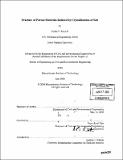Fracture of porous materials induced by crystallization of salt
Author(s)
Katzoff, Golda Y
DownloadFull printable version (2.592Mb)
Other Contributors
Massachusetts Institute of Technology. Dept. of Civil and Environmental Engineering.
Advisor
Franz-Josef Ulm.
Terms of use
Metadata
Show full item recordAbstract
The penetration of salt into porous materials is known to have deleterious effects, often resulting in fracture. The damage process begins with a saline solution penetrating the porous network by way of capillary action. This is followed by supersaturation of the saline solution, which may result in the formation of salt crystals. In turn, these salt crystals induce pressure on the pore walls. Though the stress generated by the crystallization of salt in a single pore alone is unlikely to result in fracture, if the crystallization region is large enough, the combined effects can lead to fracture. This thesis will first provide an overview of the crystallization process and then focus on the factors leading directly to fracture. The thesis will examine various key processes proposed by researchers, identify elements that have not yet been explored, and finally propose a cohesive outline of the processes responsible for fracture.
Description
Thesis (M. Eng.)--Massachusetts Institute of Technology, Dept. of Civil and Environmental Engineering, 2006. Includes bibliographical references (leaf 40).
Date issued
2006Department
Massachusetts Institute of Technology. Department of Civil and Environmental EngineeringPublisher
Massachusetts Institute of Technology
Keywords
Civil and Environmental Engineering.